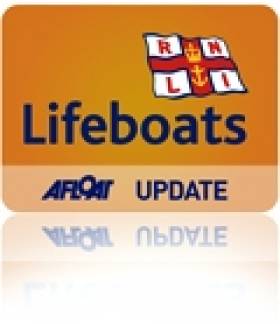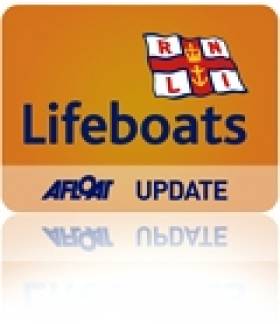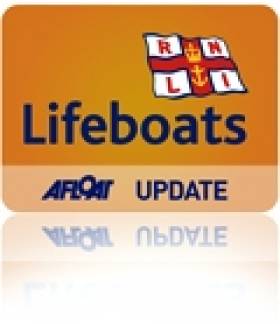Displaying items by tag: Lifejacket
Man Rescued after Fall from Boat in Ballyshannon
The use of the kill chord and a lifejacket on a boat in Donegal this week meant a man who went over board was able to be rescued quickly by Bundoran Lifeboat
The RNLI was alerted to a person in the water off Creevy Pier in Ballyshannon, Co. Donegal.
The casualty had been thrown from his boat when the steering wheel broke.
He was spotted by two local fishermen who raised the alarm with the Coastguard.
On arrival the local fishermen had retrieved the man from the water. The Lifeboat crew took the casualty onboard and landed him at Creevy where they administered first aid to him.
He was then taken to Sligo General Hospital by ambulance. The rescue helicopter 118 was also on scene and the rescue was coordinated by Malin Head Coastguard.
Speaking after the rescue, Colm Hamrogue, Press Officer for Bundoran Lifeboat commented; "The gentleman was very lucky to be spotted by the local fishermen who raised the alarm. He was wearing his life jacket and had an emergency kill switch on the engine of his boat which went a long way in saving his life.
"He is expected to make a full recovery and I would like to commend the gentleman who was rescued for following sea safety advice by wearing a life jacket and having the necessary emergency kill switch. I would also like to praise the local fishermen for their vital role in this rescue."
Related Safety posts
RNLI Lifeboats in Ireland
Safety News
Rescue News from RNLI Lifeboats in Ireland
Coast Guard News from Ireland
Water Safety News from Ireland
Marine Casualty Investigation Board News
Marine Warnings
Majority of Lifejackets Fail Lifeboat Test
Over 90% of lifejackets tested at Ireland's two biggest sailing centres failed simple checks carried out by the Royal National Lifeboat Institute (RNLI) last week writes Irish Times Sailing Columnist David O'Brien.
From 91 jackets tested in Cork and Dublin, 83 failed a free inspection.
The annual Lifejacket check service carried out by the institute was only taken up by 40 sailors from an estimated 1,000 competing crews at Cork week. 35 failed the test.
In Dun Laoghaire, last Saturday the RNLI offered the service again prior to Dublin Bay racing, where the total fleet is over 300 boats, the country's biggest sailing centre. 51 from a possible 2500 lifejackets were checked. Only three were deemed ok.
There were several different reasons for the failures including rusty or out of date inflation capsules but the bulk were rejected because jackets were not fitted with crotch straps. "It is the RNLI opinion these lifejackets may not work to their full potential because they may not keep the wearer's airway above water", says the RNLI's Kevin Rahill.
It's an important point so it is a wonder how lifejackets can be sold without them. What is not explained though is why so few sailors took up the free check or why nearly half the lifejackets presented had out of date capsules?
There is little doubt there has been an increased use of lifejackets in recent years but as last weeks survey shows it's equally important to know the lifejacket you are wearing actually works if you end up in the water.
RNLI Lifejacket Checks
Crosshaven:
LJs Checked 40
Ok 5
No Crotch Strap 18
OOD Capsule 22
OOD Hammar 1
Mk 3 Head 1
Rusty Cyl 2
Slack or Cyl out 4
Fired 3
Condemned (evidence of severe damage to fabric, mechanism etc) 1
Dun Laoghaire:
LJs Checked 51
Ok 3
No Crotch Strap 30
OOD Capsule 21
OOD Hammar 9
Mk 3 Head 1
Rusty Cyl 4
Slack or Cyl out 2
Fired 1
Condemned (evidence of severe damage to fabric, mechanism etc) 5
Since this article first appeared in the Irish Times on Friday, July 27 plans are afoot to test Lifejackets again in Dun Laoghaire in August or September.
We want your view on our forum thread HERE!
Related Safety posts
RNLI Lifeboats in Ireland
Safety News
Rescue News from RNLI Lifeboats in Ireland
Coast Guard News from Ireland
Water Safety News from Ireland
Marine Casualty Investigation Board News
Marine Warnings
Cork Week Sailors in Dramatic Rescue
A competitor returning to England from Cork Week was rescued after going overboard 50 miles off Land's End. Prue Nash, a yacht broker from Cowes, spent two hours in the water wihout a lifejacket and was lucky to survive the ordeal that took place in the early hours of Sunday morning.
Volunteer lifeboat crews from Sennen Cove and St Mary’s, Isles of Scilly, were launched in the early hours of Sunday morning following reports that the yachtswoman had fallen overboard 50 miles north west of Land’s End. Just before the lifeboats arrive on scene, the extremely fortunate sailor was found by another yacht and airlifted to hospital.
Nash was wearing a life jacket and harness when she went over the edge, but had to take them off after they became trapped and were pinning her underwater.
The racing yacht Buccaneer was returning from Cork Week Regatta in Ireland when the woman went overboard in fresh south westerly winds and a moderate sea. Another yacht, Jaguar Logic, relayed a message to Falmouth coastguards and the two lifeboats were launched, along with the rescue helicopter from RAF Chivenor.
The RNLI crews on Sennen Cove Tamar class all weather lifeboat and the St Mary’s Severn class all weather lifeboat headed for the scene at top speed. But just 12 or so miles from the scene, news came that the woman, who had been in the water for two hours, had been found alive and was being winched onboard the helicopter. She was then flown to the Royal Cornwall Hospital at Treliske in Truro, Cornwall.
The Sennen Cove lifeboat crew onboard City of London III, arrived home at 5am in the morning after an 80 mile round trip, while the crew onboard the St Mary’s relief lifeboat Beth Sells, were back in the islands at around the same time.
Terry George, RNLI Coxswain at Sennen Cove, says the woman was extremely fortunate:
‘The yachtswoman was very lucky to survive several hours in the water and in the pitch dark. Fortunately there were other yachts in the area that responded immediately and search and rescue assets were launched very quickly too. It happened a long way out but this is why the RNLI position fast response all weather lifeboats like our Tamar, at key places around the coast.’
Related Safety posts
RNLI Lifeboats in Ireland
Safety News
Rescue News from RNLI Lifeboats in Ireland
Coast Guard News from Ireland
Water Safety News from Ireland
Marine Casualty Investigation Board News
Marine Warnings
































































